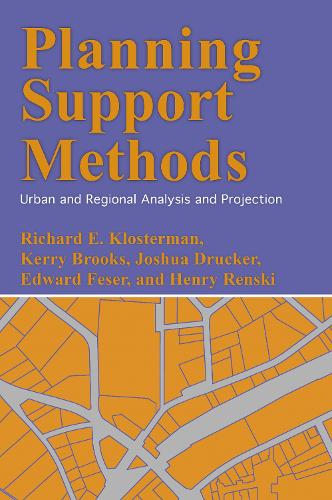
Planning Support Methods: Urban and Regional Analysis and Projection
(Paperback)
Available Formats
Publishing Details
Planning Support Methods: Urban and Regional Analysis and Projection
By (Author) Richard E. Klosterman
By (author) Kerry Brooks
By (author) Joshua Drucker
By (author) Edward Feser
By (author) Henry Renski
Bloomsbury Publishing PLC
Rowman & Littlefield Publishers
22nd June 2018
United States
Classifications
Tertiary Education
Non Fiction
Urban communities / city life
307.12160112
Physical Properties
Paperback
320
Width 176mm, Height 256mm, Spine 15mm
671g
Description
Planning Support Methods offers the only practical guide to the key methods of urban and regional planning. The authors apply and critically assess the most important methods for demographic and economic analysis and projection and land suitability analysis, providing an essential resource for practicing planners and planning students alike.
For helpful tools from the author including Excel workbooks, visit https://planningsupport.org/tools/.
For resources including PowerPoint presentations and supplemental readings, visit https://planningsupport.org/resources/.
Reviews
Writing a methods textbook is very difficult. In this instance, the authors have achieved a very good outcome. Students with some grounding should find it approachable. . . . [The] book is long overdue and a major contribution to methods teaching in professional planning. * Regional Studies *
This book aims to describe the essential quantitative methods for local and regional analysis and projection. It is best suited for planning practitioners (especially community planners) and students targeting a professional planning career. For practical planners, one key merit for this book is that, despite its breadth in quantitative regional economic methods, it requires no prerequisite of advanced statistics, calculus, or microeconomic background and materials in the book can be well understood for someone without this background. I would recommend this book to (perspective) community planners at various levels, who have interests in understanding the basics of regional population and employment projection and forecasting. . . . Overall, this book provides an important introduction to a rapidly evolving subfield. * Environment and Planning B: Urban Analytics and City Science *
In sum, the book adds to the modern approach to neighborhood-centered analysis with a focus on community, geospatial data analysis, and use case scenarios. The book provides ample illustrations, informative and user-friendly. Undergraduate and graduate students, community scientists, planners in practice, and applied researchers will find Planning Support Methods: Urban and Regional Analysis and Projection to be a comprehensive book that can be used for both bottom-up and top-down urban and regional data analysis. * Journal of Planning Education and Research *
This delightfully hands-on approach will be a breath of fresh air for students and practitioners alike. At long last we have a book that teaches urban planners to be intelligently analytical and ultrapractical. -- Ray Wyatt, University of Melbourne
Good books on planning methods are rare. Klosterman and his colleagues have done us a great service by updating Klostermans previous book and extending its scope in population forecasting, spatial analysis, and GIS. A key text. -- Michael Batty, University College London
I predictand making accurate predictions is a big part of what this new volume coversthat Planning Support Methods will become an essential go-to reference for both beginning students and experienced professionals. New chapters and sections on spatial analysis methods, land suitability analysis methods, and public participation methods help round out this extremely well-written, easy-to-use, and important new work. -- John D. Landis, University of Pennsylvania
Klosterman and his colleagues have done a masterful job of assembling and describing the core methods that planners use to understand the dynamics of urban growth and development. No other text combines demographic, economic and land suitability techniques in such an effective manner. This book provides a clear explanation of fundamental planning support methods. -- Stephen P. French, Georgia Institute of Technology
Author Bio
Richard E. Klosterman is Emeritus Professor of Geography, Planning, and Urban Studies at the University of Akron.
Kerry Brooks is Professor of Urban and Regional Planning at Eastern Washington University.
Joshua Drucker is Associate Professor of Urban Planning and Policy at the University of Illinois at Chicago.
Edward Feser is Provost and Executive Vice President, and Professor of Public Policy, at Oregon State University.
Henry Renski is Associate Professor in the Department of Landscape Architecture and Regional Planning at the University of Massachusetts, Amherst.
